Top 30 IT Project Manager Interview Questions
Are you preparing for an it project manager position? Or transitioning into a project manager role in the IT sector. We have compiled the top 30 IT Project Manager interview questions that you’re most likely to get asked during the actual interview. These questions consist of a mix of technical, behavioral, and situational topics at three different levels of an IT project manager’s questions, designed to assess your competence in delivering an IT project from start to finish.
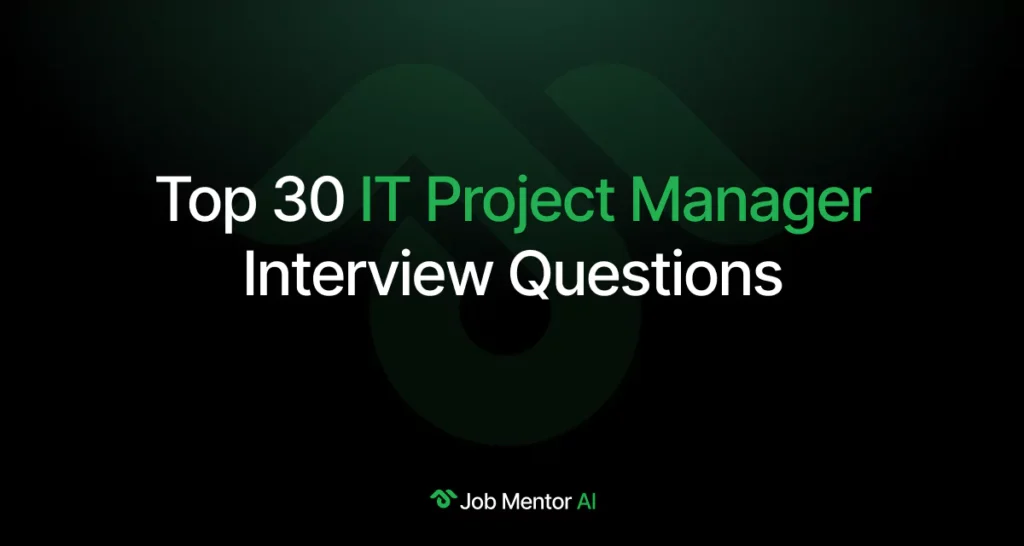
What does an IT Project Manager do?
An IT Project Manager is a professional who specializes in planning, handling, and assigning responsibilities from start to end. They work directly with the IT department so that all the projects are delivered within the scope, time, and budget. These managers will perform tasks, assignments, responsibilities, resource allocation, risk evaluation, monitoring progress, and communicating the updates to the technical as well as non-technical members of the project team.
Must-Ask IT Project Manager Interview Questions
This list of 30 interview questions is designed to help you prepare for the IT project manager position efficiently. This guide will help you regardless of whether you are a professional or a beginner.
Entry-Level Project Manager Interview Questions
1. How do you prioritize tasks in a project?
2. What tools do you use for project management?
3. How do you handle team conflicts?
4. Can you explain the project lifecycle?
5. What is scope creep, and how do you prevent it?
6. How do you define project success?
7. Describe a time when a project didn’t go as planned.
8. How do you ensure deadlines are met?
9. What are your strengths as a project manager?
10. How do you manage communication within a project team?
Mid-Level Project Manager Interview Questions
1. How do you manage scope creep in a project?
2. Discuss your experience with risk management in project delivery. How do you identify, assess, and mitigate project risks?
3. Explain your process for resource allocation and management in a project. How do you ensure optimal resource utilization?
4. Explain your approach to handling conflicts or disagreements within a project team.
5. Discuss your experience in implementing project management methodologies. Which methodology do you prefer, and why?
6. What is your process for conducting project retrospectives, and how do you implement feedback?
7. How do you prioritize tasks when faced with multiple competing deadlines or projects?
8. What role does documentation play in your project management process?
9. Describe your experience with handling project escalations. How do you address these situations effectively?
10. How do you ensure quality in deliverables?
Expert-Level Project Manager Interview Questions
1. How do you align IT projects with broader business goals?
2. What techniques do you use to facilitate effective meetings and ensure productive outcomes?
3. How do you ensure quality assurance throughout the project lifecycle?
4. How do you balance innovation with project constraints?
5. How do you deal with executive stakeholders who have conflicting priorities?
6. How do you manage project portfolios and prioritize competing initiatives?
7. Describe your approach to handling large-scale program management across multiple teams.
8. Describe your experience with post-mortem analysis after project completion.
9. Explain how you track and report project progress to senior management or stakeholders.
10. What’s your experience in managing globally distributed teams?
Entry-Level Project Manager Interview Questions
These entry-level IT project manager interview questions are focused on making sure you have understood the basic roles of what an IT project manager does, and give the interviewer a clear idea of your understanding of the role.
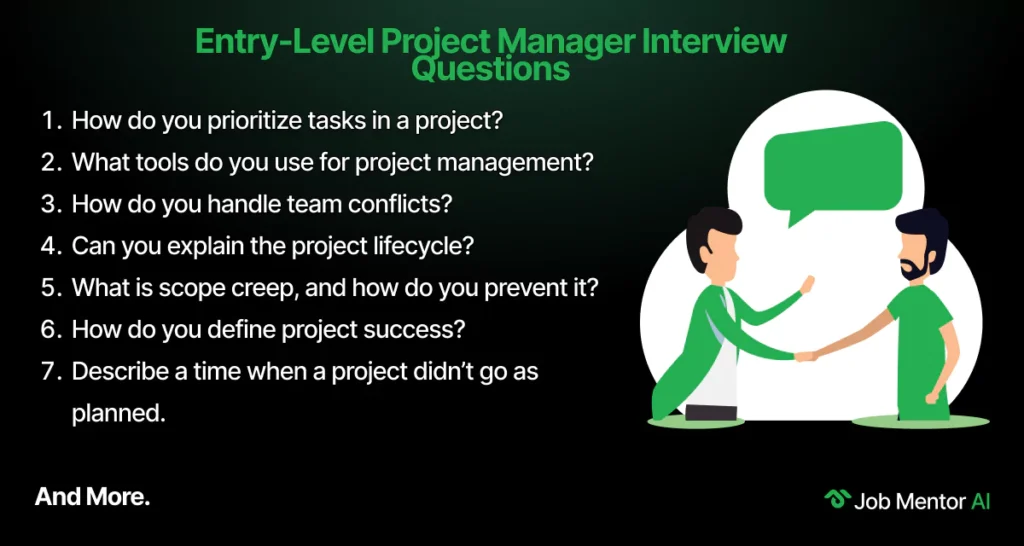
1. How do you prioritize tasks in a project?
What the interviewer expects: The interviewer assesses your organizational skills and understanding of prioritization frameworks.
Good answer:” I prioritize tasks based on a combination of urgency and impact. I usually begin by defining the critical path and identifying dependencies within the project timeline. Then, I apply methods like the Eisenhower Matrix technique to categorize tasks. For instance, in my previous internship project, I used a priority matrix to determine which modules of a software update needed development first due to their interdependencies. I also coordinate with team leads regularly to ensure priorities remain aligned with business goals and adjust based on changes or blockers. Clear communication and task management tools like Jira or Trello help me stay organized and transparent with stakeholders.”
Bad answer: “I usually just start with the easiest tasks and work my way up. That way, I get more done.”
2. What tools do you use for project management?
What the interviewer expects: Your familiarity with common project management tools and how you use them.
Good answer:” I’ve used a variety of tools depending on the project needs. For agile projects, I’ve worked with Jira and Confluence to track sprints and document progress. For scheduling and task tracking, I’ve used Microsoft Project and Trello. I also use Slack or Microsoft Teams for communication and Google Workspace or SharePoint for collaboration. I focus on using tools that match team workflows and are easy to integrate across departments.”
Bad answer: “I’ve used Excel once or twice, but I mostly just track everything in my notebook.”
3. How do you handle team conflicts?
What the interviewer expects: Emotional intelligence, problem-solving, and communication skills.
Good answer: “ When a conflict arises, I try to address it as soon as possible by talking to both parties individually to understand their perspectives. Then, I bring them together to find common ground, focusing on project goals rather than personal differences. For example, two developers on my team disagreed over implementation methods. I facilitated a discussion, encouraged compromise, and documented the final approach to prevent further friction. Clear communication and empathy help de-escalate most conflicts before they grow.”
Bad answer:“ I usually ignore it unless it gets really bad. People should just act professionally”.
4. Can you explain the project lifecycle?
What the interviewer expects: Understanding of standard project phases.
Good answer: “ Yes, the typical project lifecycle includes initiation, planning, execution, monitoring and controlling, and closing. During initiation, we define the scope and goals. In planning, we outline tasks, timelines, and resources. Execution is where work begins and deliverables are produced. Monitoring ensures progress is on track with KPIs and quality standards, and closing involves delivering the final product, releasing resources, and conducting post-mortems or reviews to gather lessons learned.”
Bad answer: “ It’s just start and finish the project accordingly.”
5. What is scope creep, and how do you prevent it?
What the interviewer expects: “ Awareness of common project risks and control methods.”
Good answer: “ Scope creep refers to uncontrolled changes or continuous growth in a project’s scope. To prevent it, I clearly define the project requirements during the planning phase and get formal sign-off from stakeholders. I also implement a change control process where any new request is evaluated for its impact on the timeline, cost, and quality before being approved. Regular communication with stakeholders and maintaining a well-managed project backlog help keep scope in check.”
Bad answer: “I just let clients add things if they want, if it makes them happy.”
6. How do you define project success?
What the interviewer expects: Your understanding of project outcomes and value.
Good answer: “ I define project success by evaluating whether the project met its objectives within the scope, time, and budget. Equally important is stakeholder satisfaction and whether the project delivers business value. I also look at team performance, the quality of deliverables, and how closely we aligned with original KPIs.”
Bad answer: “ If the client doesn’t complain, I guess it’s a success.”
7. Describe a time when a project didn’t go as planned.
What the interviewer expects: How you handle setbacks, learn from mistakes, and show accountability.
Good answer: “During a software rollout, we underestimated the time needed for QA testing. This led to delays in the release. I took responsibility and immediately adjusted the timeline, informed stakeholders, and worked with the QA team to streamline the testing process. We learned to include buffer time for testing for plans and updated our risk assessment accordingly. It was a great lesson in proactive planning.”
Bad answer: “ It was someone else’s fault. I just did my part.”
8. How do you ensure deadlines are met?
What the interviewer expects: Time management and team coordination strategies.
Good answer:” I break down the project into milestones and assign clear responsibilities with realistic timelines. I regularly review progress in team meetings and use Gantt charts or dashboards to visualize status. If any delays occur, I reassess dependencies and reallocate resources if necessary. Setting clear expectations upfront and staying in constant communication helps avoid surprises.”
Bad answer: “I just tell people the due date and hope they finish on time.”
9. What are your strengths as a project manager?
What the interviewer expects: Self-awareness and alignment with PM responsibilities.
Good answer: “My biggest strengths are communication, adaptability, and attention to detail. I ensure everyone is aligned through transparent updates, and I’m quick to adjust plans when unexpected issues arise. My ability to stay calm under pressure has helped teams navigate tight deadlines and shifting priorities without losing morale or focus.”
Bad answer: “ I don’t know, people say I communicate my thoughts well and I’m nice to work with.”
10. How do you manage communication within a project team?
What the interviewer expects: Understanding of internal collaboration and communication strategy.
Good answer: ” I set a clear communication plan early in the project that defines channels (like Slack or Teams), frequency of meetings, and reporting formats. For example, I use weekly stand-ups to monitor task progress and monthly stakeholder briefings for strategic updates. I also promote asynchronous updates via project dashboards or shared docs to respect everyone’s time zones and schedules.”
Bad answer: ” I just email everyone when something big happens.”
Explore these helpful Interview Question Guides
Mid-Level Project Manager Interview Questions
These Mid-Level Project Manager Interview Questions are designed for professionals who have moved beyond foundational skills and are ready to tackle more complex responsibilities. These questions focus on core areas such as stakeholder communication, risk management, budgeting, project scheduling, and team leadership.
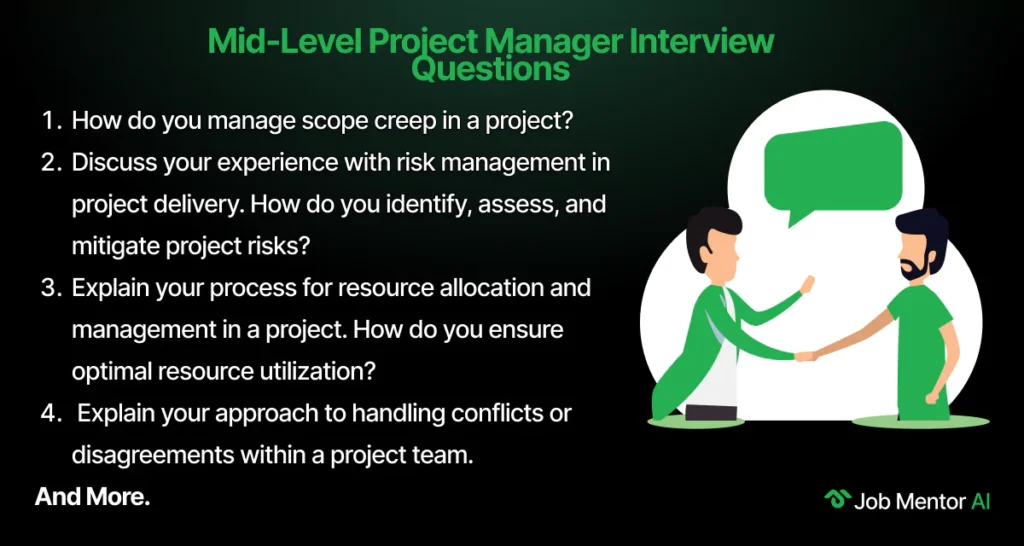
1. How do you manage scope creep in a project?
What the interviewer expects: An understanding of scope creep and how to prevent or control it using communication, documentation, and change control processes.
Good Answer: “Scope creep is a common challenge, especially in mid-sized IT projects. To manage it effectively, I implement a robust change control process. At the start of the project, I ensure that the scope is clearly defined and agreed upon by all stakeholders. If new requests come in, I evaluate their impact on time, cost, and resources before presenting them to the stakeholders for approval. I also maintain a change log and communicate updates regularly to avoid surprises. For example, in a recent CRM integration project, marketing requested additional dashboard features halfway through. I assessed the effort, consulted the developers, and helped the team prioritize the requests, ultimately shifting them to a future phase while preserving our launch timeline.”
Bad Answer: “I just try to do whatever the client wants. If they ask for something new, I usually just add it in.”
2. Discuss your experience with risk management in project delivery. How do you identify, assess, and mitigate project risks?
What the interviewer expects: The interviewer wants to assess your ability to proactively identify potential risks, evaluate their impact, and implement effective mitigation strategies. They’re looking for a structured and experienced approach.
Good Answer: “In my previous role, I used a structured risk management process that started with brainstorming sessions with key stakeholders to identify potential risks. I then assessed each risk’s likelihood and impact using a risk matrix to prioritize them. For mitigation, I always prepared contingency plans for high-impact risks and assigned risk owners to monitor specific issues. For instance, during a cloud migration project, we identified data loss as a top risk, so we scheduled incremental backups and created rollback protocols. This proactive planning ensured that even when we faced a system hiccup, we restored service with minimal downtime.”
Bad Answer: “I usually deal with risks as they come up. It’s hard to predict what might go wrong, so I just stay flexible and fix things on the go. I’ve never really had a major issue.”
3. Explain your process for resource allocation and management in a project. How do you ensure optimal resource utilization?
What the interviewer expects: They want to hear about your ability to manage people, time, and tools effectively, avoid bottlenecks, and ensure the project team is neither overworked nor underutilized.
Good Answer: “I start by understanding the scope and workload of the project, then assess team member skills and availability. I use project management tools like Microsoft Project or Jira to map out tasks, assign deadlines, and track progress. Regular status checks help me identify if resources are overloaded or underused, allowing me to make timely adjustments. In one project, I noticed a bottleneck in the QA team, so I reallocated support from another project with a lighter load, which kept the delivery timeline on track.”
Bad Answer: “I usually assign work based on who’s free at the time. I don’t get into the details of resource planning unless someone tells me they’re overloaded.”
4. Explain your approach to handling conflicts or disagreements within a project team.
What the interviewer expects: They want to evaluate your interpersonal skills, emotional intelligence, and leadership capabilities in managing team dynamics and maintaining productivity.
Good Answer: “When conflicts arise, I address them early by bringing the concerned parties together to understand each side. I facilitate open, respectful communication and focus on the project goals rather than personal opinions. Once during a sprint planning meeting, two team leads clashed over task ownership. I scheduled a separate session to mediate, helped them define roles more clearly, and documented responsibilities in the project tracker. The team dynamic improved, and we avoided future misunderstandings.”
Bad Answer: “I try to stay out of conflicts. If team members have a problem, I expect them to resolve it themselves unless it gets really bad.”
5. Discuss your experience in implementing project management methodologies. Which methodology do you prefer, and why?
What the interviewer expects: They’re evaluating your practical knowledge of methodologies and your reasoning behind choosing one based on project needs.
Good Answer: “I’ve implemented both Agile and Waterfall methodologies depending on project requirements. For software development, I prefer Agile because it supports iterative progress, flexibility, and continuous feedback. At my last job, we transitioned from Waterfall to Agile and saw a 30% improvement in delivery times. We held daily stand-ups, bi-weekly sprints, and retrospectives, which improved team alignment and responsiveness. For compliance-heavy or infrastructure projects, I still prefer Waterfall due to its clear structure and documentation.”
Bad Answer: “I don’t follow a specific methodology. I just do what feels right depending on the project and adjust along the way if necessary.”
6. What is your process for conducting project retrospectives, and how do you implement feedback?
What the interviewer expects: They want to see if you’re committed to continuous improvement and whether you take steps to actively learn from each project. This involves both facilitating retrospectives and applying the lessons learned.
Good Answer: “After each project or sprint, I organize a structured retrospective involving the whole team. We use the ‘Start, Stop, Continue’ framework to highlight what worked well, what didn’t, and what we should improve. I document key feedback and convert actionable points into backlog items or process adjustments. For example, during a website redesign project, the team pointed out recurring delays due to unclear requirements. Based on this, we updated our intake process to include detailed user stories and client sign-off checkpoints, which significantly improved clarity in the next sprint.”
Bad Answer: “We usually don’t do retrospectives unless something goes wrong. If someone has feedback, they can just send me an email.”
7. How do you prioritize tasks when faced with multiple competing deadlines or projects?
What the interviewer expects: They’re assessing your time management skills, ability to think strategically under pressure, and whether you can balance competing demands without dropping the ball.
Good Answer: “I prioritize tasks based on business impact, stakeholder urgency, and resource availability. I typically use tools like the MoSCoW method to distinguish what’s critical from what’s optional. I also maintain open communication with stakeholders to realign expectations when needed. For instance, when two high-priority projects collided during a product release window, I coordinated with leadership to adjust timelines, delegated low-priority tasks, and focused team efforts on the deliverable with the most customer impact. Both projects stayed on track without sacrificing quality.”
Bad Answer:
“I just try to multitask and get to whatever I can. If something is urgent, I’ll try to work overtime and hope it all gets done.”
8. What role does documentation play in your project management process?
What the interviewer expects: They’re looking for an understanding of how documentation helps ensure consistency, traceability, and knowledge sharing across the project lifecycle.
Good Answer: “Documentation is essential for transparency, accountability, and continuity, especially when team members transition or projects scale. I document everything from initial requirements and scope to change requests, timelines, and post-mortem notes. I ensure it’s accessible through shared drives or project tools like Confluence or SharePoint. In one project, thorough documentation helped onboard a new developer mid-sprint without delays, thanks to well-maintained user stories and technical specs.”
Bad Answer: “I find documentation slows things down. I prefer quick calls or messages instead of writing everything down.”
9. Describe your experience with handling project escalations. How do you address these situations effectively?
What the interviewer expects: They want to know how you manage high-stress situations, maintain professionalism, and protect the project while keeping stakeholders informed and reassured.
Good Answer: “When a situation escalates, like a missed deadline or a vendor issue, I first ensure I understand the root cause. I gather facts, assess the impact, and immediately communicate the situation and options to stakeholders. I then implement a mitigation plan, such as reassigning tasks, bringing in additional support, or renegotiating scope or timelines. In a recent cloud migration project, when the vendor missed a key milestone, I quickly escalated to senior leadership, reworked the deployment schedule, and implemented a parallel testing stream to recover lost time.”
Bad Answer: “I try to avoid escalations by just pushing the team to work faster. I don’t like involving higher-ups unless it’s unavoidable.”
10. How do you ensure quality in deliverables?
What the interviewer expects: Your ability in quality control processes and testing.
Good Answer: “I incorporate QA from the planning phase. I define acceptance criteria, involve QA engineers early, and implement test-driven development where possible. Peer reviews, automated testing, and staging environments help us catch issues before production. For example, during a recent e-commerce project, automated UI tests reduced post-launch defects by 40%.”
Bad Answer: “I leave that to the testing team and assume they’ll catch everything.”
Expert-Level Project Manager Interview Questions
These Expert-Level Project Manager Interview Questions are designed for professionals with extensive project leadership experience, especially in large-scale or high-stakes environments. They test your ability to handle complex projects, lead cross-functional teams, manage strategic initiatives, and align IT goals with business objectives.
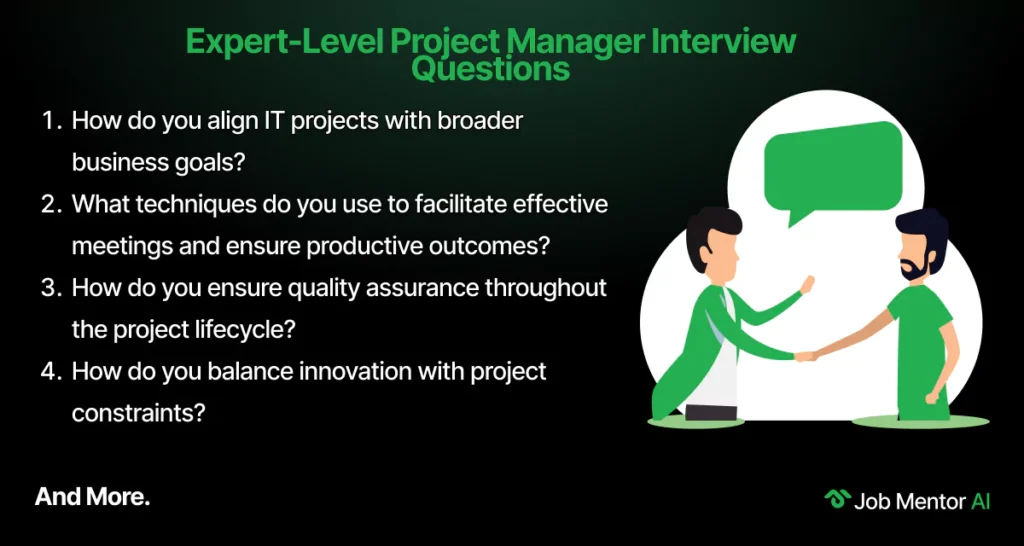
1. How do you align IT projects with broader business goals?
What the interviewer expects: Strategic thinking, business alignment, and executive communication.
Good Answer: “As an expert-level PM, I start by understanding the company’s strategic objectives, whether it’s growth, cost reduction, or customer experience. I ensure each project contributes to these goals by mapping deliverables to KPIs and OKRs. For example, in a digital transformation project, we aligned every sprint goal with reducing customer churn and improving self-service capabilities. I regularly update executives with progress reports showing how technical outcomes are tied to business value.”
Bad Answer: “I just focus on completing the project. It’s up to upper management to align it with business goals.”
2. What techniques do you use to facilitate effective meetings and ensure productive outcomes?
What the interviewer expects: They want to see how you plan, structure, and lead meetings to ensure alignment, decision-making, and action-oriented discussions, especially with cross-functional or senior teams.
Good Answer: “I ensure meetings are outcome-driven by setting a clear agenda circulated in advance, defining expected decisions or deliverables, and assigning roles (facilitator, note-taker, timekeeper). I also limit the attendee list to essential stakeholders to keep things focused. During the meeting, I manage time strictly, summarize key points in real-time, and assign action items with deadlines. I use collaboration tools like Miro or Confluence for visual planning and follow up with concise recaps. This structure keeps everyone aligned and reduces meeting fatigue.”
Bad Answer: “I usually just go with the flow. If something important comes up, we talk about it. I don’t like rigid agendas.”
3. How do you ensure quality assurance throughout the project lifecycle?
What the interviewer expects: They expect your response to include both process-driven strategies (QA/QC), proactive reviews, and alignment with customer expectations.
Good Answer: “I embed quality assurance from the start by defining quality criteria during project planning. I work closely with QA teams to create detailed test plans, checkpoints, and acceptance criteria tied to each deliverable. We implement reviews at every stage, including peer reviews, code inspections, and UAT sessions. I also ensure continuous stakeholder feedback through demos and pilots. Regular retrospectives help us adjust processes to maintain high quality across the lifecycle.”
Bad Answer: “QA is usually the development team’s job. I just make sure things are delivered on time.”
4. How do you balance innovation with project constraints?
What the interviewer expects: They want to assess your ability to bring creativity without jeopardizing scope, timeline, or budget.
Good Answer: “I encourage innovation by creating buffer time in early stages for brainstorming and prototyping, especially in Agile sprints. But we always validate ideas against business value, feasibility, and constraints. I use prioritization techniques like MoSCoW or cost-benefit analysis to weigh trade-offs. This helps introduce new ideas without compromising deliverables. I also communicate with stakeholders to align innovation with strategic goals and budget realities.”
Bad Answer: “I prefer to stick to the plan, trying new things usually delays projects and upsets clients.”
5. How do you deal with executive stakeholders who have conflicting priorities?
What the interviewer expects: They want to see strong stakeholder management skills, including communication, negotiation, and decision-making facilitation.
Good Answer: “I handle conflicting priorities by first listening to each stakeholder’s goals and understanding their underlying needs. I then identify overlaps and align them with the overall business strategy. I use frameworks like RACI and stakeholder impact grids to clarify roles and influence. If alignment isn’t possible, I facilitate structured discussions or escalate through governance forums. Transparency and data-driven arguments help resolve conflicts effectively.”
Bad Answer: “I usually just follow the highest-ranking stakeholder’s direction to avoid tension.”
6. How do you manage project portfolios and prioritize competing initiatives?
What the interviewer expects: Experience with portfolio management, strategic alignment, and value-based prioritization.
Good Answer: “I manage portfolios by aligning initiatives with business objectives and available capacity. I use a scoring model that evaluates value, risk, ROI, and strategic alignment. This allows us to rank and prioritize projects objectively. I also coordinate with department heads to assess dependencies, allocate resources, and balance short-term wins with long-term impact. Regular portfolio reviews help us adapt to shifting priorities.”
Bad Answer: “I pick the ones that are easiest to deliver first. It makes my workload more manageable.”
7. Describe your approach to handling large-scale program management across multiple teams.
What the interviewer expects: They want to see experience with complex, multi-team programs, dependency management, and cross-functional coordination.
Good Answer: “For large-scale programs, I establish a program governance structure with a central PMO, defined communication channels, and integrated planning tools like Jira Portfolio or MS Project Online. I assign workstreams to project leads, maintain a master schedule, and conduct weekly syncs to track milestones and manage interdependencies. Risk management is proactive with heat maps, and I ensure cross-team alignment via sprint reviews, shared OKRs, and stakeholder demos.”
Bad Answer: “I let each team do their own thing. As long as they meet their deadlines, I assume it’s fine.”
An Admin role can perform all operations, while an Employee role can only read data.
8. Describe your experience with post-mortem analysis after project completion.
What the interviewer expects: Understanding of continuous improvement practices, root cause analysis, and implementing lessons learned.
Good Answer: “Post-mortems are essential for growth. I conduct structured sessions shortly after project completion with all key stakeholders. We use the ‘Start-Stop-Continue’ method and 5 Whys for root cause analysis. I document findings in a knowledge base and ensure action items are assigned for future improvement. These insights are shared in team onboarding and integrated into process updates.”
Bad Answer: “We don’t usually do post-mortems unless something went wrong. It’s not always necessary.”
9. Explain how you track and report project progress to senior management or stakeholders.
What the interviewer expects: They want structured reporting, metrics, and stakeholder-friendly communication.
Good Answer: “I use dashboards and project health reports to track progress, covering scope, schedule, cost, and risks. I provide weekly executive summaries, highlight deviations, and outline mitigation steps. I tailor the communication format to the audience: visual charts for execs, task-level updates for delivery teams. Tools like Power BI, Jira, and Monday.com help maintain real-time visibility.”
Bad Answer: “I send out emails occasionally and update them if they ask. I don’t track progress in a detailed format.”
10. What’s your experience in managing globally distributed teams?
What the interviewer expects: They expect strategies for communication, collaboration across time zones, and maintaining team cohesion.
Good Answer: “I’ve led globally distributed teams across North America, Asia, and Europe. I overcome time zone challenges with rotating meeting schedules, overlapping hours, and async tools like Slack, Loom, and Confluence. I emphasize clarity in communication, documenting decisions, and using shared workspaces. I foster culture with virtual team-building and one-on-ones. It’s about creating a sense of inclusion and shared ownership despite the distance.”
Bad Answer: “It’s tough working with teams in other time zones. I just let them work independently and catch up later.”
Skills an IT Project Manager Should Have
- Think Outside The Box: A great project manager uses creative problem-solving to navigate roadblocks and deliver innovative solutions that keep the project moving forward.
- Leadership: IT project managers must guide their teams with confidence and consistency to meet project objectives.
- Accountability: Responsible for reporting to the project manager for the management of those delivering the project for such things as timeline ad quality objectives.
- Time Management: prioritizing, delegation, and scheduling gradually deliver quality products at the required time.
- Adaptability: IT project managers can get projects ready even under pressure due to being flexible and responsive to adjusting requirements or setbacks.
Tips to Prepare for an IT Project Manager Interview
These are some tips that can help you prepare for an IT Project Manager
- Understand the Basics: Be familiar with IT fundamentals like system architecture, APIs, deployment processes, and cloud environments.
- Understand the Industry: You must understand how the industry works and its basics.
- Practice Mock Interview: You can ask for help from friends or family to help you prepare for the interview, or use AI mock interview practice when no one is around.
- Practice Realistic Questions: You can research IT project manager interview questions or use an AI interview answers generator.
- Be Familiar With Tools: Know the use cases for different tools such as Jira, Asana, Trello, MS Project, or Smartsheet, as well as integration with GitHub, Slack, or Confluence.
Conclusion
Whether you are going to enter the profession of an IT Project Manager or get promoted, it is best to be interview-ready. Through this guide, you have been taken through key questions, both of entry-level, mid-level, and expert-level to allow you to enhance your technical, as well as leadership perspectives, consider the real-world experience You may re-read those sections where you have some problems and you can be armed with intelligent answers to demonstrate your expertise on how to lead, handle teams and achieve results. You can even use AI Interview Assistant to practice for your upcoming interview to boost your confidence.
Top 30 IT Project Manager Interview Questions
Table of Contents
Recommended Resources
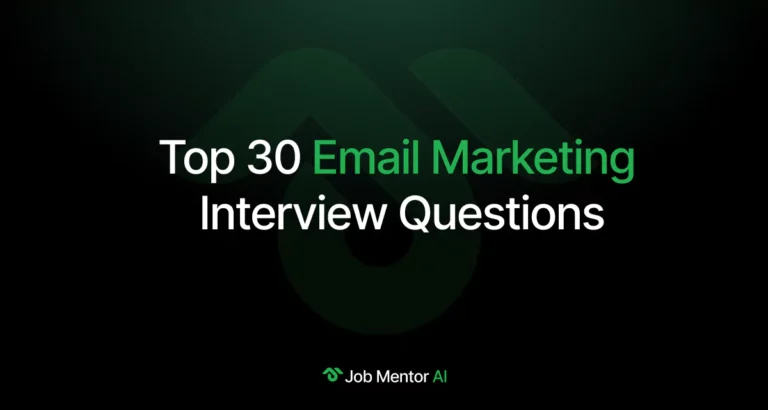
30 Email Marketing Interview Questions For 2025
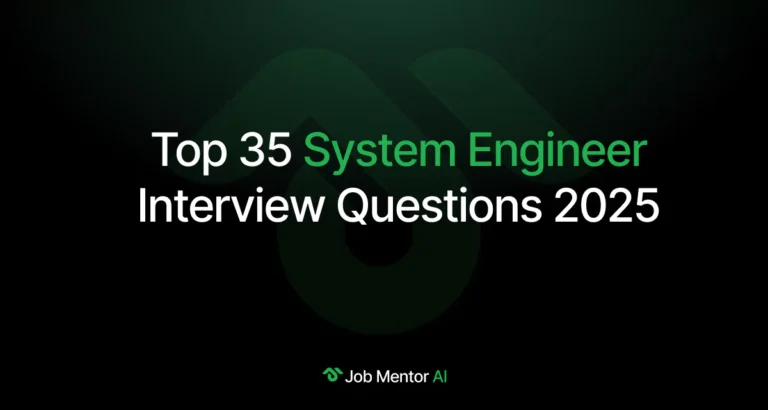
Top 35 System Engineer Interview Questions 2025
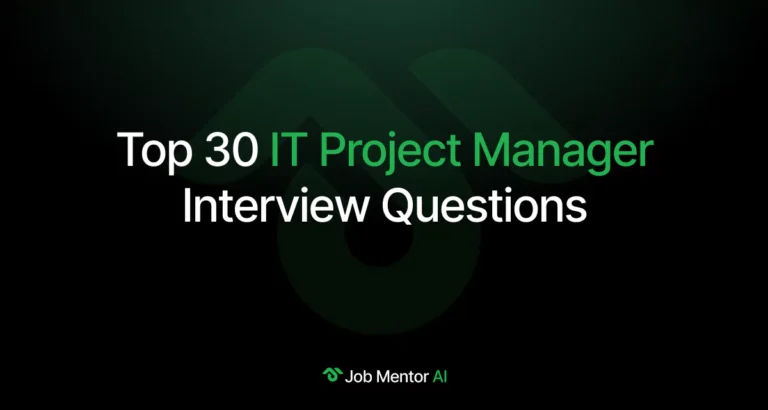
Top 30 IT Project Manager Interview Questions
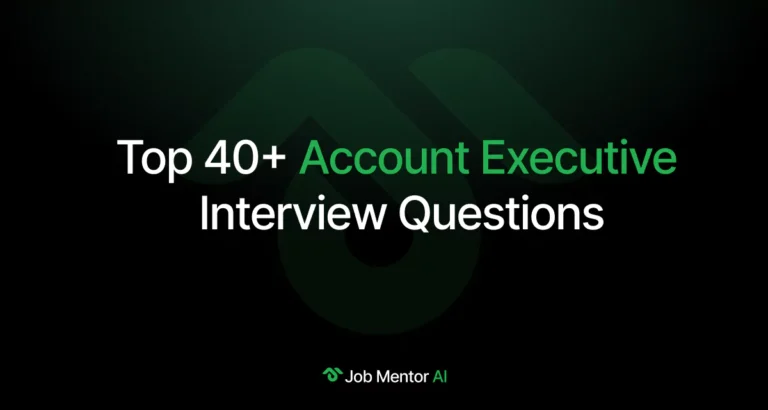
Top 40+ Account Executive Interview Questions
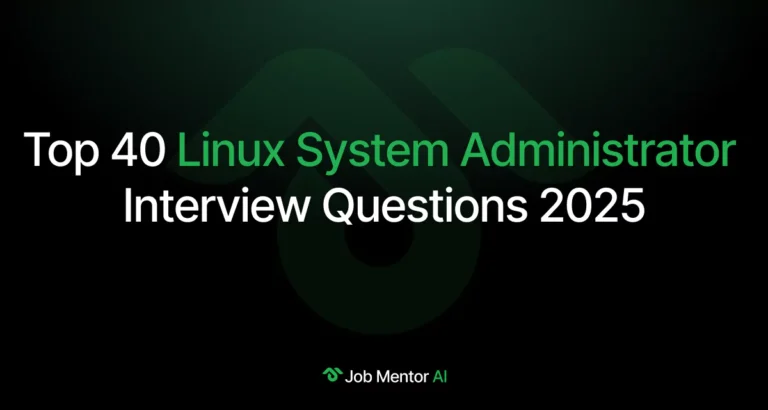
Top 40 Linux System Administrator Interview Questions 2025
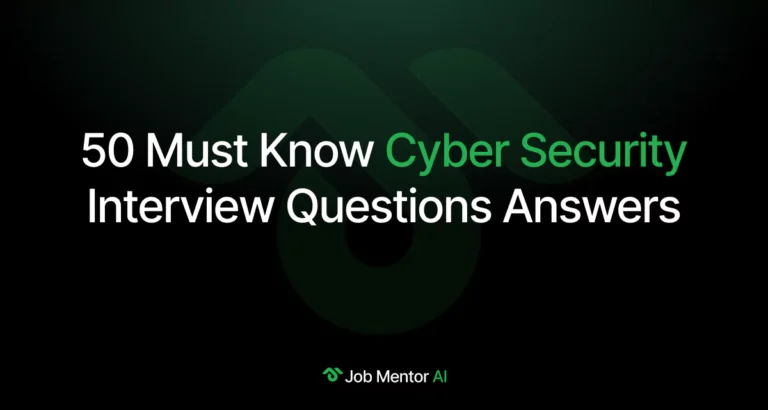
50 Must Know Cyber Security Interview Questions Answers


